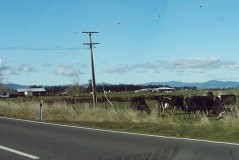Trucks Discharge Criticised
Dirty and dangerous discharges of effluent from stock trucks appear to be on the increase in the Waikato and the Waikato regional council has written to trucking firms asking them to take action to stop this practice.
The annual Gypsy Day is officially today – a time when farmers traditionally move stock around. This can occur over several days at the start of the month and the council is warning that stiff fines for discharges can be imposed.
Effluent appears on the road when storage on stock trucks is deliberately discharged or accidentally overflows from the truck’s holding tanks. These sorts of discharges can cause traffic crashes if they make roads slippery or spatter on to windscreens.
Discharge is also a health hazard for cyclists, motorcyclists and pedestrians, and causes smelly and unsightly pollution on highways and road sides.
Transport group manager Vaughan Payne said Waikato Regional Council has been receiving regular complaints about spills, generally from the public or from local authority officers around the region. A number of investigations are ongoing into the complaints.
“Deliberately discharging stock effluent on to roads or the environment is unacceptable and illegal.
“Also, truck operators need to ensure that effluent holding facilities don’t get so full that they start to overflow without the driver’s knowledge.
“The fact that the effluent tank on the truck has become full without the driver’s knowledge is not a justified excuse for a spill.”
Truck operators can be fined up to $1000 if they receive an infringement notice for breaching the rules, while much more significant fines can be handed down if matters are taken to court.
Mr Payne said that, besides using authorised effluent dump sites, there were various strategies that can help stop spills.
For example, keeping stock off green feed for a minimum of 4-12 hours before transport will reduce their effluent output while on trucks.
Another option is for truckies to offload effluent already on board on to a farmer’s paddocks as fertiliser, providing they have the farmer’s permission and follow relevant rules.
The council is also investigating adding new authorised stock effluent dumping sites to the existing network in the region to help reduce potential for spills












1 Comments
Not just Waikato, I had the misfortune to slip over and land in a puddle of effluent in Temuka in Feburary…
Worst day of my life.